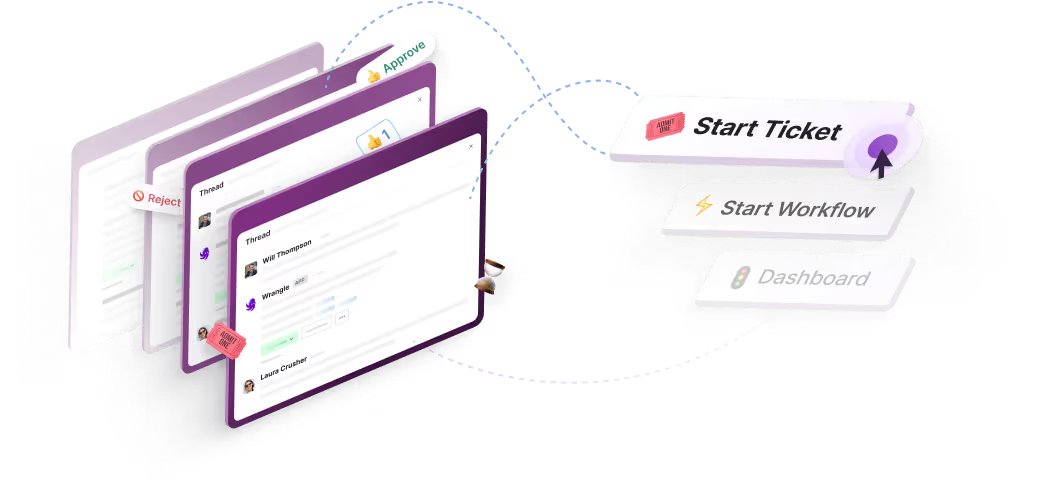Process vs. Project
Projects are for a one-time deliverable. A process is a repeated workflow.


There are lots of tools for getting work done on a team. If you're looking to better organize how your team works, you should decide whether you're managing projects or processes.
Once you understand that, you can decide how to measure them and how to track them using software tools.
Key Differences
Though they sound similar, and both involve completing tasks, there are important differences between what we call a "process" and a "project."
- Projects happen once, processes repeat. A project has a final deliverable and then end. For example, a marketing event will have a project plan that becomes irrelevant once the event has happened. Processes happen repeatedly, because they're triggered by something that happens often — new leads coming in, new contracts going out, etc.
- Projects change during execution, processes are rigid. A project may have an initial plan, but as they progress they often change. New requirements come in, complications emerge, and the managers have to evolve to meet the goal. For example, a vendor at our marketing event may notify us that they can no longer provide a key service, so we need a backup plan. On the other hand, a process changes rarely, and not in the middle of doing some work. It's important to be rigid, because the people executing the process need to be able to learn their part and gain experience executing it quickly. For example, procurement departments will have multiple purchase orders to process in a day, so efficiency is key.
- Projects are only about tasks, processes have approvals and decisions. A project plan is a list of tasks. A process involves tasks, but also decisions, approvals, and information collection. For example, a time-off request process requires managers to approve vacations.
- A project's history isn't important, but auditing a process is crucial. Once you're done, it's rarely useful to look back at how a project was completed. A process, on the other hand, needs a clear audit trail. We often need to know who made key decisions, like who approved a large purchase, how long it took to approve, and whether the goods were delivered.
- There's only one instance of a project, but many of a process. Since a project has a specific deliverable and then it ends, we only need to monitor the project's tasks to see where it is. However, a process is different. There are multiple instances of a process, each running in parallel. For example, if we're a legal team approving sales contracts, there are likely many contracts being reviewed by our process. So to see how our process is doing overall, we look at how many of those contracts are getting through, how fast they're getting reviewed, and whether any are getting stuck. There are multiple instances of a process, but just one of a project.
Examples of Projects
- Product development: launching a new version of a product happens once. The project plan tracks the engineering team's tasks as the requirements evolve, coalescing around a launch date in the future.
- Planning for a marketing event: your company's upcoming conference has a plan for securing a space, hiring vendors and caterers, and for the different presentations to the audience.
- Launching a new marketing campaign: your marketing team will have a detailed list of all the tasks that need to happen to launch a new messaging campaign across all the digital and physical channels you target.
Examples of Processes
- Customer onboarding: each time a new customer signs a contract, a customer experience team goes through a repeatable set of steps to welcome them, train them on your product, and deliver any services required.
- Contract approval: when someone wants to make a purchase or sign a partnership with another company, the legal department has a set of reviews that need to take place. Each time someone comes with a new contract, the process is repeated.
- PTO: HR teams specify how much vacation you can take and who should approve the request. Each time you or a colleague make a request, the process is followed.
How To Measure The Performance of Projects vs. Processes
Once you've decided whether you're dealing with a project or a process, you can then think about how to measure that work. If you have the right lens for success, you can then apply software tools to help you organize the team and meet that goal.
Measuring success is a complex and involved topic, but here are some straightforward, general ideas for how to start. If you work in the tech industry, you might read more about measurement related to software project KPIs.
Measuring Projects
- Task completion: a project is on track if the tasks are being completed in the right time frame
- Extra work added: since a project is just the evolving list of tasks to get to a deliverable, project managers will track the expanding scope of work as new requirements or changes happen. The more extra work, the slower the delivery is
- On budget, on time: these two components can be summed up by how things stand once the final deliverable is completed — did we do it by the deadline and did we do it profitably. Since the project only happens once, those are readily apparent.
Measuring Processes
- Are we making good decisions: a process involves decision-making. For example, should we sell to this customer for this price? If we design a thoughtful set of steps for our team to make these decisions, that means we have a useful process
- Are we, on average, fast enough: processes, like projects, need to be as quick as possible. However, since a process is repeated many times, we track the average time it takes to go through the process to measure success.
- Are we meeting the goal of the process: finally, processes aren't about a deliverable, they're about increasing some business goal. For example, are we onboarding new employees effectively so they can be productive soon after hiring them? Are we signing contracts for services work that we can actually, profitably deliver? Are we approving purchases that are beneficial to our business and priced correctly?
Tools For Managing Projects vs. Processes
Now that you know how to measure your process or project, there are software tools that can help you organize your team and meet the goals
Project Management Tools
Project management may be the most common software product category, so there are lots of tools. There are both tools for generic project tracking and for projects in specific domains.
General Project Management Tools
These tools can be used for any kind of project:
- Spreadsheets: the most ubiquitous project management tool is the humble spreadsheet. Put your tasks in column A, then put your due dates, current status, and assignees in the other columns and you have a basic project tracker
- Smartsheet: this is an app that adds steroids to a spreadsheet, with more types of cells and useful ways to look at your due dates
- Trello: inspired by Kanban production methods, Trello is a series of columns populated by "cards." A card can represent each work item in a project and can be assigned to someone to complete. The columns represent states of the task, like "not started," "in progress," and "completed." Assignees can drag their cards through the stages as they complete their work.
- Monday/Asana: these are dedicated software platforms for projects, similar to Trello and Smartsheet. Where they excel is in providing all kinds of views to the state of tasks, from waterfall diagrams to Kanban boards to calendar views.
Team-Specific Project Management Tools
These are project management tools tailored to specific kinds of work:
- Basecamp: Basecamp is used by client services teams. They have dedicated workspaces where you can collaborate on projects with outside clients
- Jira: Jira is a project management tool made for software engineering teams. It has features for tracking bugs, features, and upcoming releases. It's also tied to their code repository, so they can save new code and have it complete the task tracked in Jira for that code.
Process Automation Tools
We've had tools for tracking and automating the processes of a specific team for a while. But generic tools that can work with any kind of process (and processes that span multiple teams) are just emerging.
Team-Specific Process Automation Tools
- Salesforce: For a sales team, tracking deals moving through the sales stages is the most important process. A customer relationship management (CRM) tool is perfect for this, especially if you automate your Salesforce processes.
- Github: Github is a cloud storage site for a software engineering team's code. There are dedicated approval workflows for reviewing new code and deciding whether it should be accepted.
- Gusto: Gusto is an HR platform that has built-in workflows for requesting time off or adding a new employee to your payroll
Generic Process Automation Tools
- Wrangle: Wrangle is an easy-to-use process automation tool that can be used for any process in your company, including the ones performed by the team-specific tools. A generic process tool like Wrangle includes features to map your process, assign people to tasks and approvals, and then to automate notifying those people each time work moving through the process arrives at their assigned step. That way, you can track your process as easily as tracking a package shipped by Amazon.

- Try Wrangle free for 14 days
- Turn messages into trackable tickets
- Build a scalable help desk



Turn Slack into a productivity powerhouse with Wrangle
Create a scalable helpdesk in Slack. Automatically turn messages into trackable tickets and provide faster, more transparent service to your colleagues and customers with Wrangle — Try it free!






